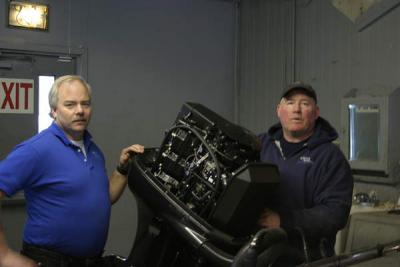Learning the tools of the marine trade
During nearly 30 years in the boat repair and maintenance business, Steve Lawrence and John Bernier, co-owners of North Atlantic Marine Services, have hired many employees. They found that they were also firing many employees. Too many. Even those employees who came with certificates from the best training courses and schools in the area. So they decided to train their own workers, offering a basic marine technician class at Massasoit Community College in Brockton.
Last fall they moved their classroom to Wareham, opening a 7,000-square-foot location on Route 6 that hosts classes on fiberglassing, engine repair, and boating safety. Located just down the road from Shaw's in a building that formerly housed a car dealership, North Atlantic also offers vessel repair and maintenance.
"Our focus here is to provide the student with the skills they need to become successful employees," said Bernier. "There's money to be made if you're a good technician."
"As of two weeks ago, there was already a shortage of marine technicians for the upcoming season on Cape Cod," Lawrence added.
The numerous required skills for a good marine technican drives the demand. You have to be a carpenter, plumber, electrician, a little bit of everything to work on a boat.
Each boat is a "total custom job," Lawrence said in comparing auto with boat manufacturing. "If you have a 2002 Ford Taurus, you have different interiors and different color. A 2002, 32-foot SeaRay all have the same hull but have different layouts and configurations according to the number of heads [bathrooms] and beds."
In addition to multiple skill-sets, projects require critical thinking.
"Everything is shoehorned in on a boat, and things keep getting smaller and smaller," said Lawrence. For one project, the shop has 22 inches through which to remove an old and install a new $27,000 engine.
Interestingly, the demand for good technicians has only increased with the poor economy. Many boat owners are focusing on repairing rather than buying a new boat and service has replaced sales as the main revenue generator for boat businesses.
Despite increased demand for the skills, there are few educational opportunties for those interested in working on recreational boats. Boat builders and engine manufacturers used to frequently hold training sessions at their facilities, but these classes have been discontinued with the recession. Upper Cape Regional Vocational Technical High School offers training programs for high school students, but few opportunities remain for adults who are interested in switching careers.
Kathy Larsen worked for ten years in corporate America before deciding she wanted to become a marine technician.
"I love the water, boats and working with my hands, and I wanted a new challenge," she said.
The engine technician class has eight students who work in teams of two to take apart and then completely rebuild a variety of engines in a variety of conditions.
Herb Maher, who travels from Marblehead each week for the three-hour class, is taking apart one engine dredged from the bottom of the ocean in hopes that its crankshaft will be salvageable for use in rebuilding another 4-cylinder engine.
"It's wonderful, like a medical internship in terms of the hands-on opportunity," he said. "Most courses offered limited hands-on experience, but that's what you need."
Lawrence said that hands-on learning was one of the main goals of their course. After each engine is disassembled, the students must diagnose why it failed and then clean, sandblast and resurface all the parts before putting the engine back together. Each class of students works on a new set of engines,
"When you give somebody a hands-on experience on a P.O.S [colorful language redacted] versus something that has been reassembled many times, they're constantly re-engineering and modifying the job for their specific needs," Lawrence said.
The class gathers during the last hour to discuss and explain their progress during the day in order to foster a group-learning experience. Some sessions also include a classroom component, and Lawrence and Bernier are working with the Small Business Administration to further develop their curriculum and to convert storage space into a classroom and a room to store inventory.
Beginning in March, North Atlantic Marine will offer classes in marine electronics, scratch/gelcoat repair, safe boating, and spring engine preparation. In April, they will begin courses on marine first aid and CPR, safe boating, boating for women, and nautical knowledge. Classes cost $10 per class hour, and some courses may have additional lab and materials fees.
"The concept we use here is turnkey-go-boating: If your boat has a problem on Sunday, your boat's got to be fixed by Friday so you can be ready for the next weekend," Lawrence said. He and Bernier are hoping to train the next generation of employees ready to accomplish that task.












